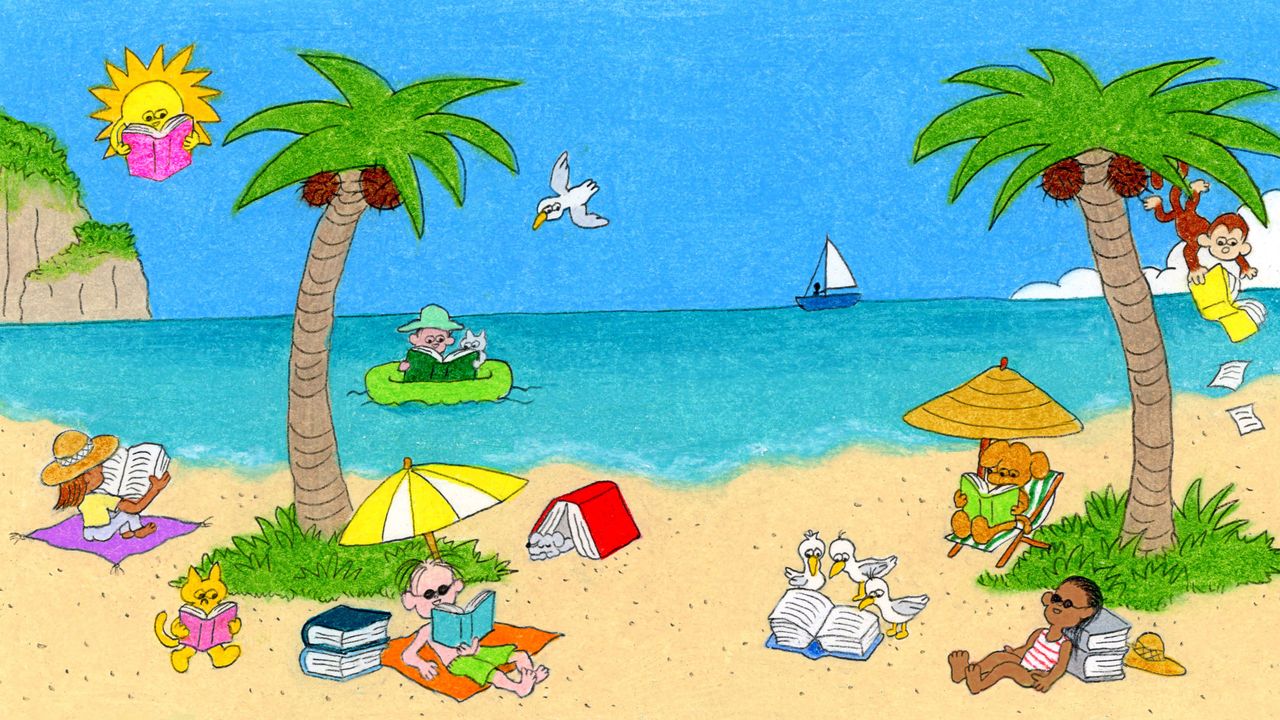What We’re Studying This Summer time: Mega-Reads
In contrast to Peter Thiel and Giorgia Meloni, I didn’t develop up with “The Lord of the Rings” in my life, and, studying it now with my son, it’s onerous to pinpoint what about it he finds so entrancing. (Often, when Tolkien will get going about Balin, son of Fundin, and Aragorn, son of Arathorn, I’ve to show away from my child and punctiliously suppress a yawn.) The leisure worth of the “Harry Potter” books, that are among the many most tightly plotted confections ever offered, wants no explaining. “Harriet the Spy,” a subtly acerbic sendup of Manhattan socialites as seen by way of the eyes of their emotionally uncared for youngsters, holds up shockingly nicely. However “The Lord of the Rings,” regardless of all that I’d heard about darkish magic and epic battles, is generally about strolling by way of the forest. As one widespread plot synopsis on TikTok goes, “Stroll, stroll, disguise, stroll, stroll, stroll—steal some mushrooms!” My son watched the TikTok and laughed, conceding the purpose, then went again to studying. (“The Firm filed slowly alongside the paths within the wooden, led by Haldir, whereas the opposite Elf walked behind.”) I lay down subsequent to him, taking the guide from him and beginning to learn aloud. (“The Firm marched on, till they felt the cool night come and heard the early night-wind whispering amongst many leaves.”) And after some time, virtually regardless of myself—“He laid his hand upon the tree beside the ladder: by no means earlier than had he been so out of the blue and so keenly conscious of the texture and texture of a tree’s pores and skin and of the life inside it”—I felt the hypnotic lull overtake me, too.
Katy Waldman on “The Deptford Trilogy”
Freud is out, Jung is in, and, this summer time, you would possibly deal with your self to Robertson Davies, a devotee of the psychotherapist, who would have permitted of Davies’s perception that the most effective books afford an “exploration, extension, and reflection of 1’s innermost self.” “The Deptford Trilogy,” which consists of the novels “Fifth Enterprise,” “The Manticore,” and “World of Wonders,” traces the results of a seemingly small act of boyish violence. On December 27, 1908, Boy Staunton (a literal boy, double-underlining Davies’s curiosity in archetypes) throws a snowball with a stone hid in it at his good friend Duncan. He misses, and as an alternative strikes a pregnant lady who goes into untimely labor. Afterward, the girl’s thoughts dissolves and an ethereal simplicity units in; Duncan, the snowball’s meant goal, believes that she could have developed miraculous powers. He has grown as much as turn into a revered hagiologist, and is narrating the primary quantity of the collection in testy reply to a newspaper article about his retirement that solid him as a middling determine. Now, as he surveys his personal life and the destiny of Boy (mysterious, grisly) and different members in that childhood scene, he wonders about his position of their collective drama—was he hero, villain, confidante, or, maybe, the fifth enterprise, the slippery additional who brings the story to a detailed?
“The Manticore” picks up the thread with a brand new narrator, David Staunton, son of Boy. He’s a rationalist lawyer who sentences himself to Jungian evaluation after the dying of his father. In Davies’s palms, the interpretation of desires turns into swashbucklingly grand, mystical, stunning, and grotesque. “World of Wonders” facilities on one of many earlier books’ most enigmatic personalities: Magnus Eisengrim, illusionist extraordinaire, who unfolds secrets and techniques of his personal.
I learn these books once I was a teen-ager and was floored by their depth and grandeur. Rereading them now, drowning in textual content—and particularly in unvoiced textual content, with no human behind it—I like their talkiness. Davies’s characters are mesmerizing audio system, who reside to spar, lecture, and lie. They’re old school and pretentious and peevish, and so they maintain forth about all the things from theatre to polyamory to the character of the Satan. Their speeches, at their headiest, encourage hope and a sort of holy terror. (“In brief, Davey, God will not be lifeless. And I can guarantee you God will not be mocked.”)
Jennifer Wilson on “Conflict and Peace”
The translators of “Gaza: The Poem Mentioned Its Piece,” by the Palestinian poet Nasser Rabah, have been relieved when, after a interval of no contact with Rabah and his household, they lastly obtained phrase final winter that he was alive. The information was bittersweet, coming through a video clip of Rabah, surrounded by the rubble of his house library in Gaza, pulling a guide from the particles: “Conflict and Peace,” by Leo Tolstoy. It’s a novel I first learn in faculty, and have thought again on regularly previously 12 months and a half as pictures from Israel’s assault on Gaza and the following humanitarian disaster have sat unusually on my social-media feed alongside reactions to celeb gossip and debates concerning the state of guide reviewing.

0 Comment